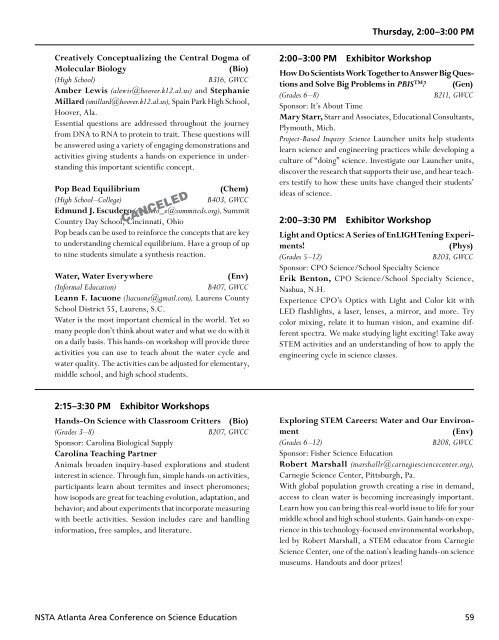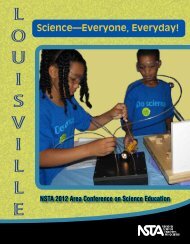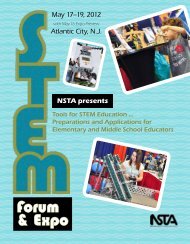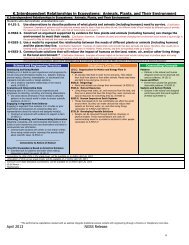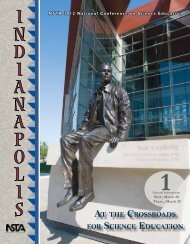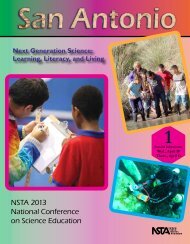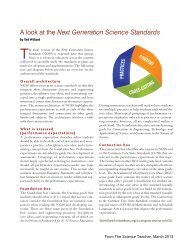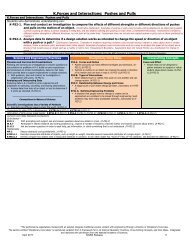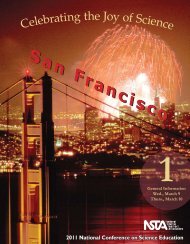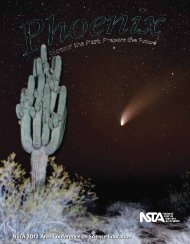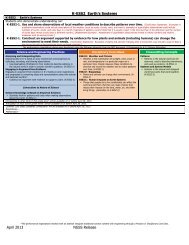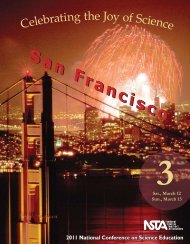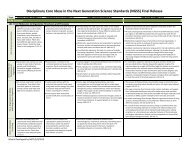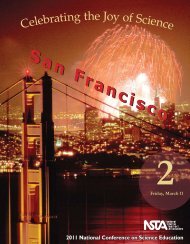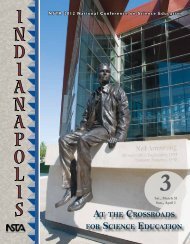Atlanta Conference Program
Atlanta Conference Program
Atlanta Conference Program
You also want an ePaper? Increase the reach of your titles
YUMPU automatically turns print PDFs into web optimized ePapers that Google loves.
Thursday, 2:00–3:00 PM<br />
Creatively Conceptualizing the Central Dogma of<br />
Molecular Biology<br />
(Bio)<br />
(High School)<br />
B316, GWCC<br />
Amber Lewis (alewis@hoover.k12.al.us) and Stephanie<br />
Millard (smillard@hoover.k12.al.us), Spain Park High School,<br />
Hoover, Ala.<br />
Essential questions are addressed throughout the journey<br />
from DNA to RNA to protein to trait. These questions will<br />
be answered using a variety of engaging demonstrations and<br />
activities giving students a hands-on experience in understanding<br />
this important scientific concept.<br />
Pop Bead Equilibrium<br />
(Chem)<br />
(High School–College)<br />
B403, GWCC<br />
Edmund J. Escudero (escudero_e@summitcds.org), Summit<br />
Country Day School, Cincinnati, Ohio<br />
Pop beads can be used to reinforce the concepts that are key<br />
to understanding chemical equilibrium. Have a group of up<br />
to nine students simulate a synthesis reaction.<br />
CANCELED<br />
Water, Water Everywhere<br />
(Env)<br />
(Informal Education)<br />
B407, GWCC<br />
Leann F. Iacuone (liacuone@gmail.com), Laurens County<br />
School District 55, Laurens, S.C.<br />
Water is the most important chemical in the world. Yet so<br />
many people don’t think about water and what we do with it<br />
on a daily basis. This hands-on workshop will provide three<br />
activities you can use to teach about the water cycle and<br />
water quality. The activities can be adjusted for elementary,<br />
middle school, and high school students.<br />
2:00–3:00 PM Exhibitor Workshop<br />
How Do Scientists Work Together to Answer Big Questions<br />
and Solve Big Problems in PBIS (Gen)<br />
(Grades 6–8)<br />
B211, GWCC<br />
Sponsor: It’s About Time<br />
Mary Starr, Starr and Associates, Educational Consultants,<br />
Plymouth, Mich.<br />
Project-Based Inquiry Science Launcher units help students<br />
learn science and engineering practices while developing a<br />
culture of “doing” science. Investigate our Launcher units,<br />
discover the research that supports their use, and hear teachers<br />
testify to how these units have changed their students’<br />
ideas of science.<br />
2:00–3:30 PM Exhibitor Workshop<br />
Light and Optics: A Series of EnLIGHTening Experiments!<br />
(Phys)<br />
(Grades 5–12)<br />
B203, GWCC<br />
Sponsor: CPO Science/School Specialty Science<br />
Erik Benton, CPO Science/School Specialty Science,<br />
Nashua, N.H.<br />
Experience CPO’s Optics with Light and Color kit with<br />
LED flashlights, a laser, lenses, a mirror, and more. Try<br />
color mixing, relate it to human vision, and examine different<br />
spectra. We make studying light exciting! Take away<br />
STEM activities and an understanding of how to apply the<br />
engineering cycle in science classes.<br />
2:15–3:30 PM Exhibitor Workshops<br />
Hands-On Science with Classroom Critters (Bio)<br />
(Grades 3–8)<br />
B207, GWCC<br />
Sponsor: Carolina Biological Supply<br />
Carolina Teaching Partner<br />
Animals broaden inquiry-based explorations and student<br />
interest in science. Through fun, simple hands-on activities,<br />
participants learn about termites and insect pheromones;<br />
how isopods are great for teaching evolution, adaptation, and<br />
behavior; and about experiments that incorporate measuring<br />
with beetle activities. Session includes care and handling<br />
information, free samples, and literature.<br />
Exploring STEM Careers: Water and Our Environment<br />
(Env)<br />
(Grades 6–12)<br />
B208, GWCC<br />
Sponsor: Fisher Science Education<br />
Robert Marshall (marshallr@carnegiesciencecenter.org),<br />
Carnegie Science Center, Pittsburgh, Pa.<br />
With global population growth creating a rise in demand,<br />
access to clean water is becoming increasingly important.<br />
Learn how you can bring this real-world issue to life for your<br />
middle school and high school students. Gain hands-on experience<br />
in this technology-focused environmental workshop,<br />
led by Robert Marshall, a STEM educator from Carnegie<br />
Science Center, one of the nation’s leading hands-on science<br />
museums. Handouts and door prizes!<br />
NSTA <strong>Atlanta</strong> Area <strong>Conference</strong> on Science Education<br />
59


